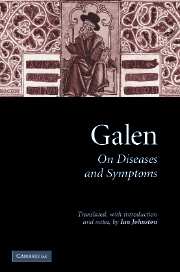Book contents
- Frontmatter
- Contents
- List of tables
- Acknowledgements
- List of abbreviations
- PART I INTRODUCTION
- I.1 General introduction
- I.2 Galen's life and works
- I.3 Galen's philosophical and medical antecedents
- I.4 Definitions and terminology
- I.5 The classification of diseases and symptoms
- I.6 Causation in diseases and symptoms
- PART II TRANSLATION
- PART III CONCLUSION
- Bibliography
- Index
I.6 - Causation in diseases and symptoms
Published online by Cambridge University Press: 22 September 2009
- Frontmatter
- Contents
- List of tables
- Acknowledgements
- List of abbreviations
- PART I INTRODUCTION
- I.1 General introduction
- I.2 Galen's life and works
- I.3 Galen's philosophical and medical antecedents
- I.4 Definitions and terminology
- I.5 The classification of diseases and symptoms
- I.6 Causation in diseases and symptoms
- PART II TRANSLATION
- PART III CONCLUSION
- Bibliography
- Index
Summary
INTRODUCTION
The terms cause and causation are relevant to a large part of day-to-day experience yet the concepts and theories underlying them have been matters of contention since the beginning of philosophy and remain so today. Galen, in the two treatises on causation in the four works under consideration, sets out to give an account of the causes of diseases and symptoms. This should be distinguished from an attempt to give a theoretical analysis of causation in disease and its related symptomatology, although he does make a brief excursion into the latter. In other words, he is aiming to provide an exhaustive (as he sees it) list of causes of diseases and symptoms which is of practical relevance to the practising doctor in that elimination or counteraction of causative factors is of primary importance in prophylaxis and treatment, just as recognition of causative factors is critical to diagnosis. So these are practical works. But they are also works with a significant embedded theoretical component which, when taken in conjunction with his other works on causation, signal Galen's interest in the fundamental aspects of the subject. This is as it should be for a doctor who is also a philosopher.
The purpose of this chapter is, then, primarily to examine Galen's views on causes and causation in diseases and symptoms, particularly as revealed by the presently considered treatises, but also to consider his views expressed in other works in which causation has an important role.
- Type
- Chapter
- Information
- Galen: On Diseases and Symptoms , pp. 81 - 126Publisher: Cambridge University PressPrint publication year: 2006
- 4
- Cited by



